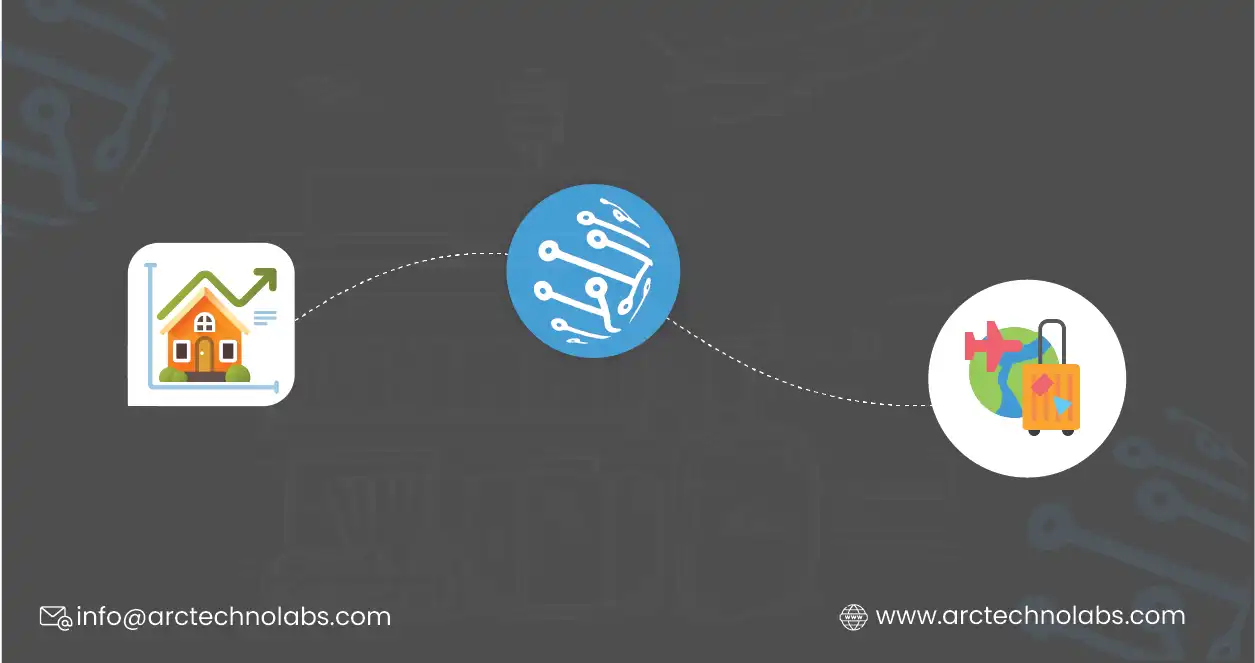
Introduction
In the highly competitive travel industry, pricing optimization is key to profitability. Airlines, travel agencies, and hotel chains must continuously adjust their pricing strategies to stay ahead of fluctuating market conditions. One of the most significant yet often overlooked factors influencing travel pricing is real estate data. Trends in property values, rental rates, and commercial real estate developments directly impact hotel room pricing and flight demand. As a result, travel companies are turning to Real Estate Property Data Scraping to collect and analyze real-time property insights for better decision-making.
With rising digital transformation, leveraging Web Scraping Real Estate Data has become essential for travel companies. The ability to extract real estate data—ranging from rental prices to commercial property trends—gives travel businesses a competitive edge in predicting demand and adjusting pricing strategies.
Impact of Real Estate Data on Travel Pricing
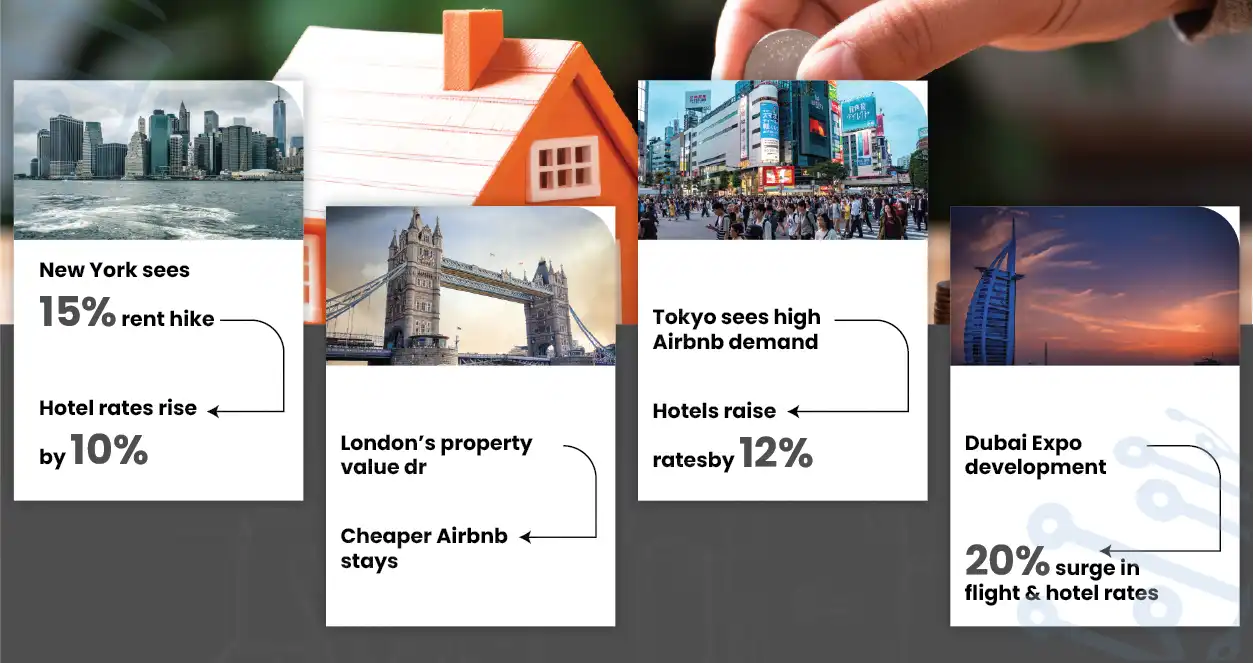
The relationship between real estate and travel pricing is significant. Commercial real estate data scraping helps travel businesses understand how property values and rental rates influence accommodation costs. The table below highlights key real estate trends and their impact on travel pricing:
| Real Estate Trend | Effect on Travel Pricing | Example |
|---|---|---|
| Rising rental prices | Increased hotel and vacation rental costs | New York sees 15% rent hike → Hotel rates rise by 10% |
| Declining property values | Lower accommodation costs, more budget travel options | London’s property value drop → Cheaper Airbnb stays |
| High demand for rentals | Limited hotel availability → Premium pricing for remaining spots | Tokyo sees high Airbnb demand → Hotels raise rates by 12% |
| New commercial developments | More tourist attractions → Increased travel demand & higher prices | Dubai Expo development → 20% surge in flight & hotel rates |
These insights emphasize the necessity of Extracting Real Estate Property Datasets to optimize travel pricing strategies.
How Web Scraping Helps Travel Companies Optimize Pricing?
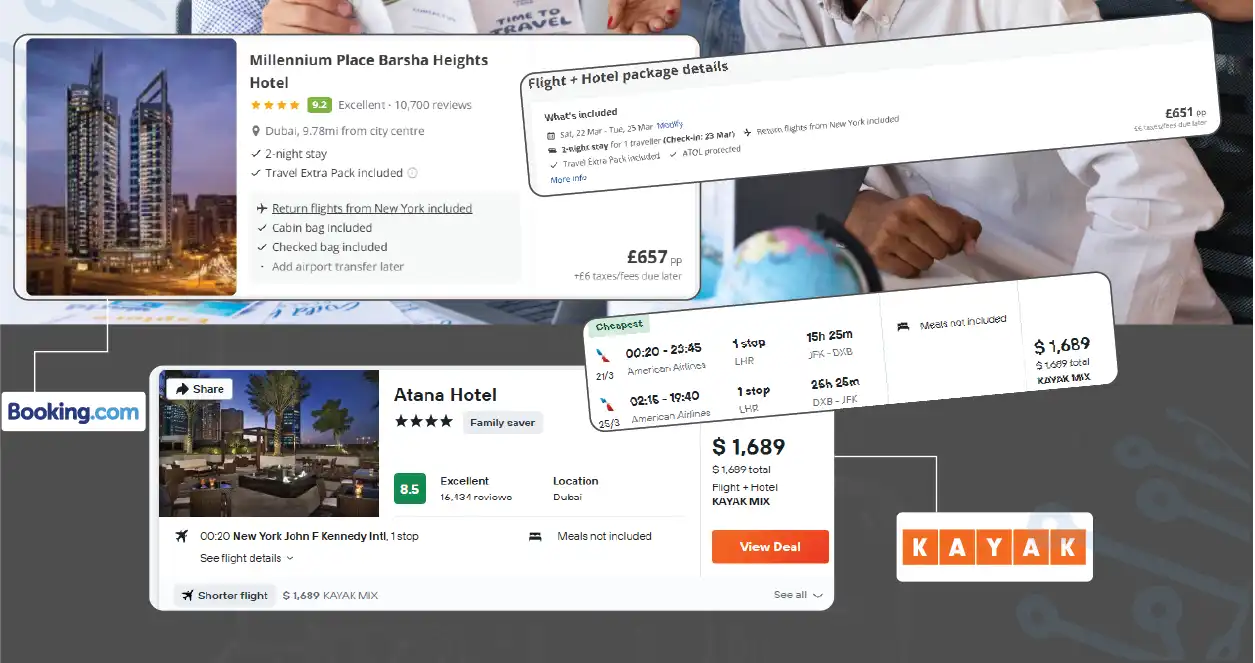
Traditional methods of collecting real estate data are slow and unreliable. With thousands of property listings updated daily across platforms, manual data gathering is impractical. Instead, travel companies use Web Scraping for Real Estate to automate large-scale data extraction.
By leveraging Commercial Real Estate Data Scraping, businesses can collect real estate pricing data from platforms like Airbnb, Zillow, and MLS listings. The extracted data is then analyzed to optimize pricing models. Below is a breakdown of how travel companies use Real Estate Data Scraping Services:
| Use Case | Data Extracted | Business Impact |
|---|---|---|
| Monitoring rental property trends | Average nightly rates, availability, occupancy rates | Adjust hotel pricing dynamically based on Airbnb trends |
| Comparing real estate values | Property sale prices, rental income potential | Set vacation package prices according to property demand |
| Forecasting peak travel seasons | Booking frequency, price fluctuations, tourist influx data | Predict seasonal pricing changes for flights and hotels |
| Competitor price analysis | Competitor hotel rates, room availability, discounts | Optimize pricing to stay competitive in key travel markets |
In today’s dynamic travel industry, real estate trends directly impact flight and hotel pricing. By implementing Real Estate Property Data Scraping, travel businesses can stay ahead of market shifts, set competitive prices, and maximize revenue. With the power of Web Scraping Real Estate Data, companies can access real-time insights, anticipate trends, and optimize pricing models effectively.
Looking to harness Web Scraping Services for pricing optimization? Contact ArcTechnolabs today and gain a competitive edge in the travel industry!
The Role of Real Estate Data in Travel Pricing
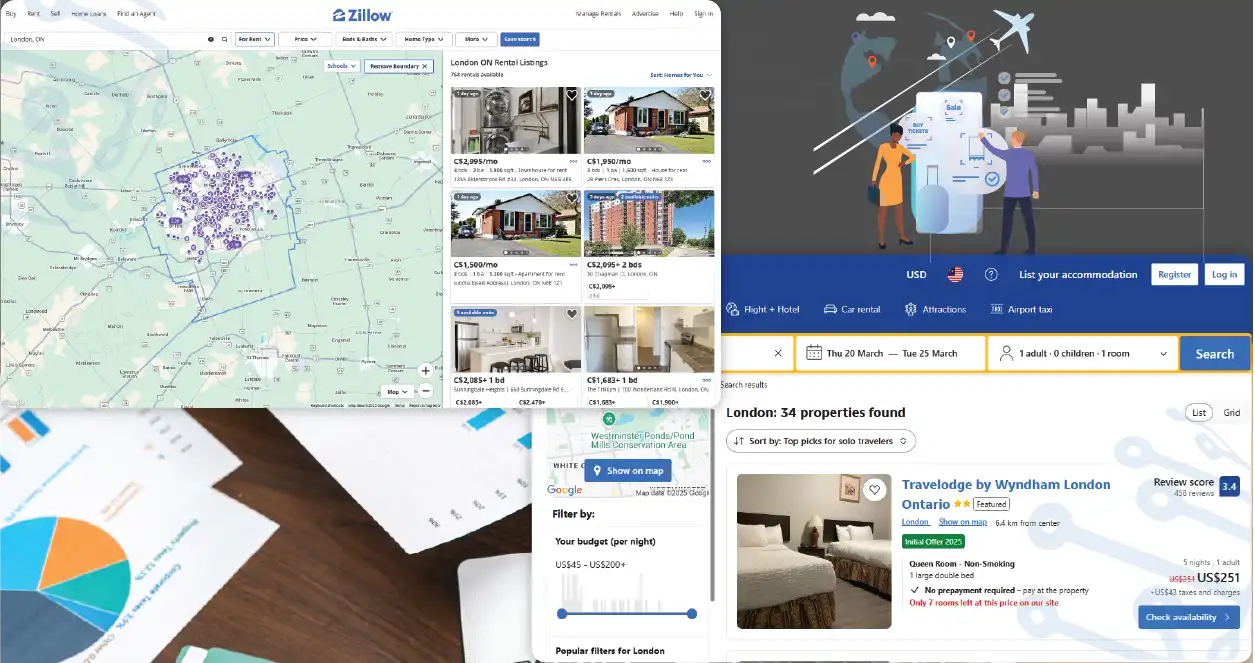
1. Influence of Real Estate Trends on Hotel & Rental Pricing
Real estate market trends significantly impact accommodation pricing for hotels, vacation rentals, and Airbnb properties. Travel companies leverage Web Scraping for Real Estate Property to monitor these trends and optimize pricing strategies.
- High property values & rental rates → Increased hotel and vacation rental pricing, making travel expensive.
- Declining property values → More budget-friendly accommodations, attracting cost-conscious travelers.
- Seasonal property demand → Peak seasons result in higher rental rates, while off-seasons offer discounts.
For example, real estate prices in New York City or London drive up hotel prices, whereas affordable housing markets make destinations like Bali or Vietnam cheaper for travelers.
2. Importance of Web Scraping for Real Estate Property in Travel Pricing
With Web Scraping Services, travel platforms extract real estate trends to adjust accommodation pricing dynamically.
- Extract real estate pricing trends from online property listings to assess accommodation affordability.
- Monitor vacation rental fluctuations and adjust travel package pricing accordingly.
- Identify emerging travel hotspots by analyzing property demand and new developments.
For instance, travel companies use Web Scraping API Services to fetch rental price trends from Airbnb, Booking.com, and Zillow, ensuring competitive pricing.
3. Extracting Real Estate Property Datasets for Demand Analysis
By scraping rental property datasets, travel platforms analyze real estate demand to predict price surges in specific locations.
- Analyze rental property trends to determine high-demand seasons for specific cities.
- Compare regional property prices to adjust flight and hotel pricing dynamically.
- Track commercial real estate data scraping for business travel insights, influencing corporate travel pricing strategies.
For example, corporate travel agencies use commercial real estate data scraping to assess business district trends in cities like Dubai, Singapore, or Tokyo to optimize business-class flight and hotel rates.
4. Role of Web Scraping Services & API in Data Collection
Automated data collection tools such as Mobile App Scraping Services and Web Scraping API Services streamline real estate data extraction.
- Automated Web Scraping Services collect property data from real estate portals, ensuring accurate price trends.
- Mobile App Scraping Services extract rental price data from travel and real estate mobile apps.
- Web Scraping API Services integrate property data into pricing models for real-time rate adjustments.
For instance, an airline might use Web Scraping API Services to pull data from Zillow or Airbnb to adjust airfare based on expected accommodation expenses at different destinations.
5. Business Impact of Real Estate Data on Travel Pricing
Leveraging Real Estate Data Scraping Services enables travel platforms to offer dynamic pricing models, ensuring competitive and profitable pricing strategies.
- Refined travel pricing models using real estate data insights.
- Dynamic pricing strategies adjusting hotel and flight costs based on real estate demand.
- Enhanced travel competitiveness through data-driven accommodation pricing optimization.
For example, Expedia and Booking.com use extracting real estate property datasets to determine peak demand periods and adjust hotel rates accordingly.
By integrating Web Scraping for Real Estate, travel businesses ensure their pricing remains competitive while maximizing revenue opportunities.
Key Data Points Extracted from Real Estate Websites
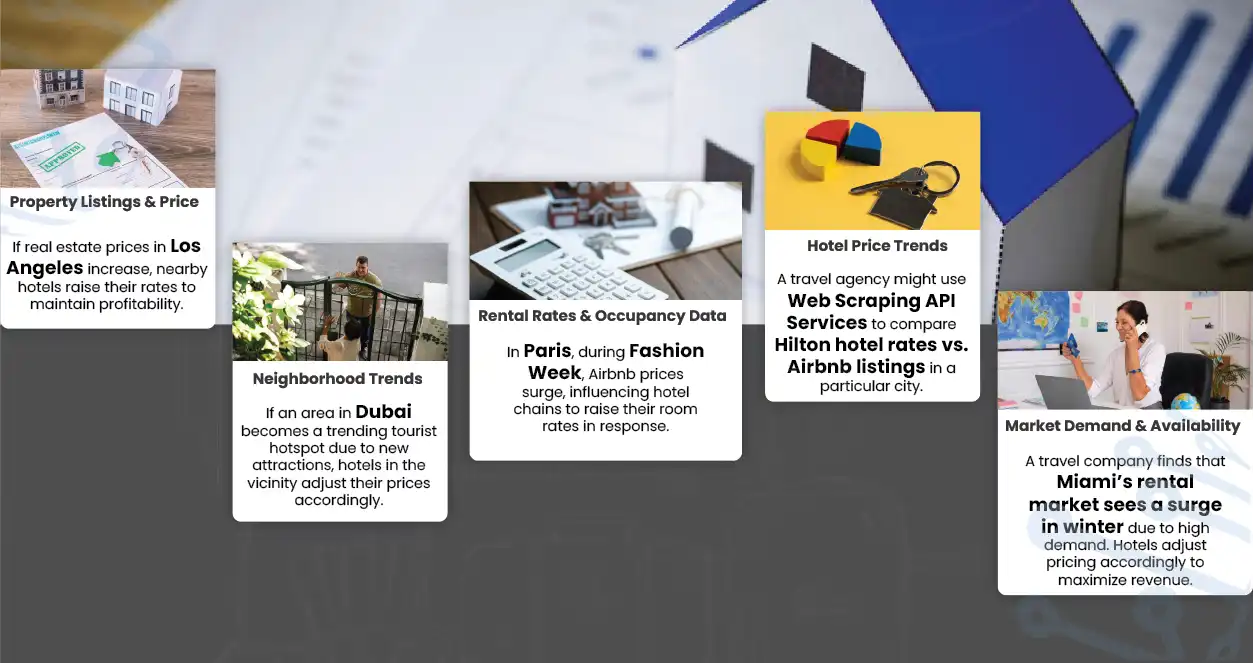
1. Property Listings & Prices
Travel companies use Real Estate Property Data Scraping to monitor property prices and align hotel and vacation rental pricing strategies. By analyzing property prices, travel platforms can determine whether accommodations in a particular area are affordable or premium.
- Example: If real estate prices in Los Angeles increase, nearby hotels raise their rates to maintain profitability.
2. Neighborhood Trends
Using Web Scraping Real Estate Data, travel businesses can track neighborhood trends and identify high-demand areas. These insights help airlines and hotel chains optimize pricing strategies based on real estate-driven demand.
- Example: If an area in Dubai becomes a trending tourist hotspot due to new attractions, hotels in the vicinity adjust their prices accordingly.
3. Rental Rates & Occupancy Data
By scraping rental property datasets, travel companies analyze short-term rental rates and occupancy levels to adjust hotel pricing dynamically. Higher rental demand often leads to increased hotel rates, while lower occupancy results in discounts.
- Example: In Paris, during Fashion Week, Airbnb prices surge, influencing hotel chains to raise their room rates in response.
4. Hotel Price Trends
With Web Scraping For Real Estate Property, travel platforms compare traditional hotel rates with vacation rental pricing to offer competitive options to travelers.
- Example: A travel agency might use Web Scraping API Services to compare Hilton hotel rates vs. Airbnb listings in a particular city.
5. Market Demand & Availability
Using Commercial Real Estate Data Scraping, travel companies forecast peak travel seasons by monitoring property demand and availability.
- Example: A travel company finds that Miami’s rental market sees a surge in winter due to high demand. Hotels adjust pricing accordingly to maximize revenue.
By leveraging Real Estate Data Scraping Services, travel businesses can implement dynamic pricing strategies, ensuring competitive rates while maximizing profits.
How Web Scraping for Real Estate Optimizes Flight & Hotel Pricing
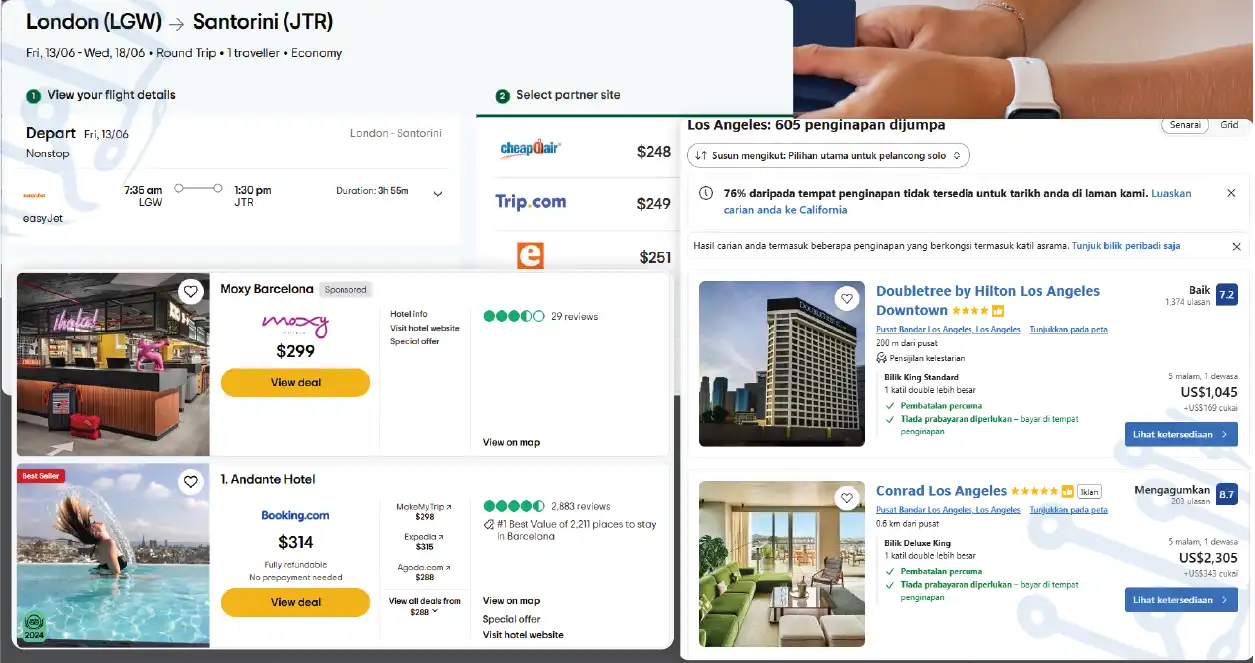
1. Scraping Rental Property Datasets Helps Airlines Adjust Ticket Prices
Airlines use Scraping Rental Property Datasets to analyze accommodation trends and adjust ticket prices accordingly. If Real Estate Property Data Scraping shows increased demand for rental properties in a location, airlines anticipate higher travel demand and increase fares.
- Example: If Web Scraping Real Estate Data reveals that short-term rental demand in Santorini surges during peak tourist seasons, airlines adjust flight prices accordingly.
2. Web Scraping for Real Estate Property Aids Hotel Chains in Setting Competitive Room Rates
Hotels leverage Web Scraping for Real Estate Property to monitor housing market trends and set competitive room prices. If real estate rental costs increase, hotels raise their rates to match market conditions.
- Example: Commercial Real Estate Data Scraping shows that vacation rentals in Los Angeles are in high demand, prompting hotels to adjust their pricing to attract travelers.
3. Real Estate Data Scraping Services Allow Travel Platforms to Track Short-Term Rental Market Fluctuations
Using Real Estate Data Scraping Services, travel platforms monitor fluctuations in rental property prices. This data helps them offer competitive hotel deals that align with rental price trends.
- Example: If Extracting Real Estate Property Datasets shows rental price drops in Barcelona, travel platforms offer discounted hotel rates to attract bookings.
4. Mobile App Scraping Services Fetch Property Data from Airbnb, Booking.com, and Vrbo
With Mobile App Scraping Services, travel companies extract pricing insights from vacation rental apps such as Airbnb, Booking.com, and Vrbo. This data allows hotels to benchmark their pricing against rental properties and adjust accordingly.
- Example: A hotel chain uses Web Scraping Real Estate Data from Airbnb to ensure their pricing remains competitive against short-term rentals in New York City.
By leveraging Real Estate Property Data Scraping, travel companies optimize pricing strategies to stay competitive, maximize revenue, and enhance customer satisfaction.
Real-Life Use Cases of Real Estate Property Data Scraping in Travel Pricing
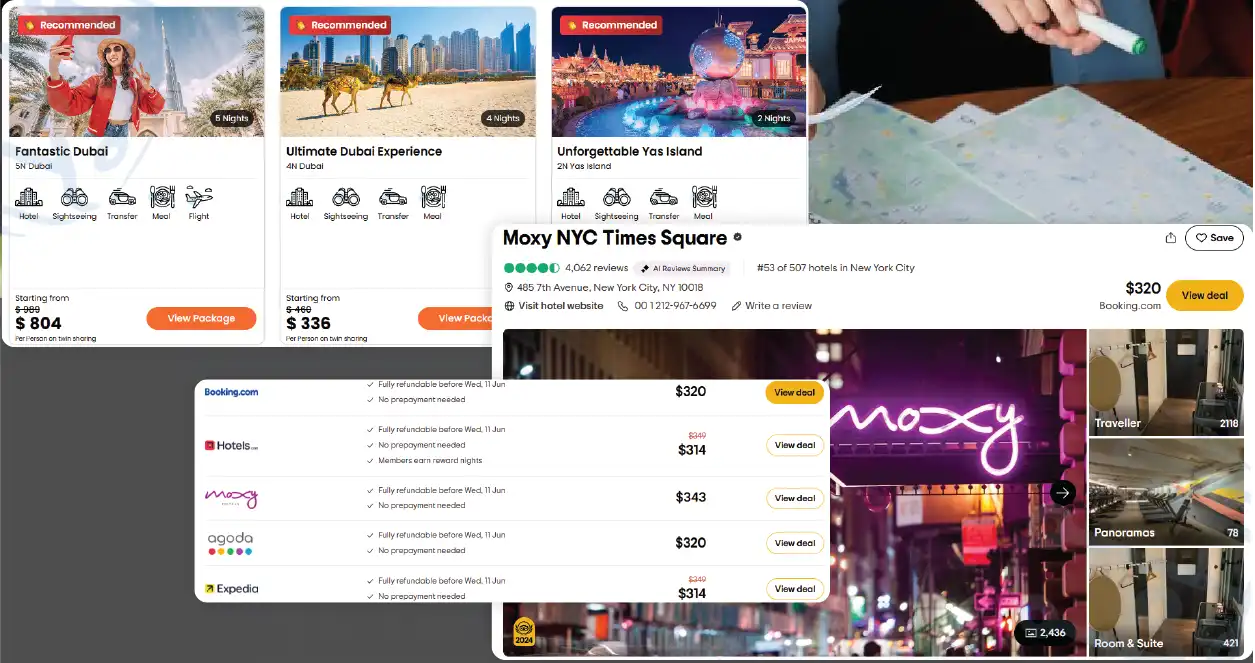
Use Case 1: Airlines Adjusting Ticket Prices Based on Accommodation Costs
Airlines leverage Real Estate Property Data Scraping from vacation rental platforms to dynamically adjust airfare pricing. By analyzing Web Scraping Real Estate Data, airlines can predict demand fluctuations and modify fares accordingly.
- Example: If Extracting Real Estate Property Datasets from Paris vacation rentals shows a rise in accommodation costs, airlines increase ticket prices due to expected high demand.
- Example: If Scraping Rental Property Datasets indicates lower rental rates in off-season months, airlines may offer promotional fares to encourage travel.
Use Case 2: Travel Agencies Offering Tailored Vacation Packages
Travel agencies rely on Web Scraping for Real Estate to assess hotel and property rental prices when creating affordable vacation bundles. With access to Commercial Real Estate Data Scraping, agencies can analyze market trends, compare accommodation costs, and offer customized flight and hotel deals.
- Example: A travel agency might use Real Estate Data Scraping Services to identify budget-friendly hotels in Dubai and pair them with discounted flights.
- Example: By integrating Web Scraping API Services, they automate data collection and optimize package pricing based on real-time accommodation trends.
Use Case 3: Hotel Chains Tracking Competitor Rates
Major hotel brands utilize Commercial Real Estate Data Scraping to track rental property pricing on platforms like Airbnb, Vrbo, and Booking.com. By continuously monitoring competitor rates through Web Scraping for Real Estate Property, hotels can implement dynamic pricing strategies to stay competitive.
- Example: If a luxury rental in New York City lowers its rates, a hotel chain can adjust its room prices accordingly using Mobile App Scraping Services.
- Benefit: This enables hotels to attract more guests by aligning their prices with alternative accommodation options.
By leveraging Web Scraping Services, travel businesses can extract valuable insights, adjust pricing models, and enhance their overall competitiveness in the industry.
Challenges in Web Scraping Real Estate Data
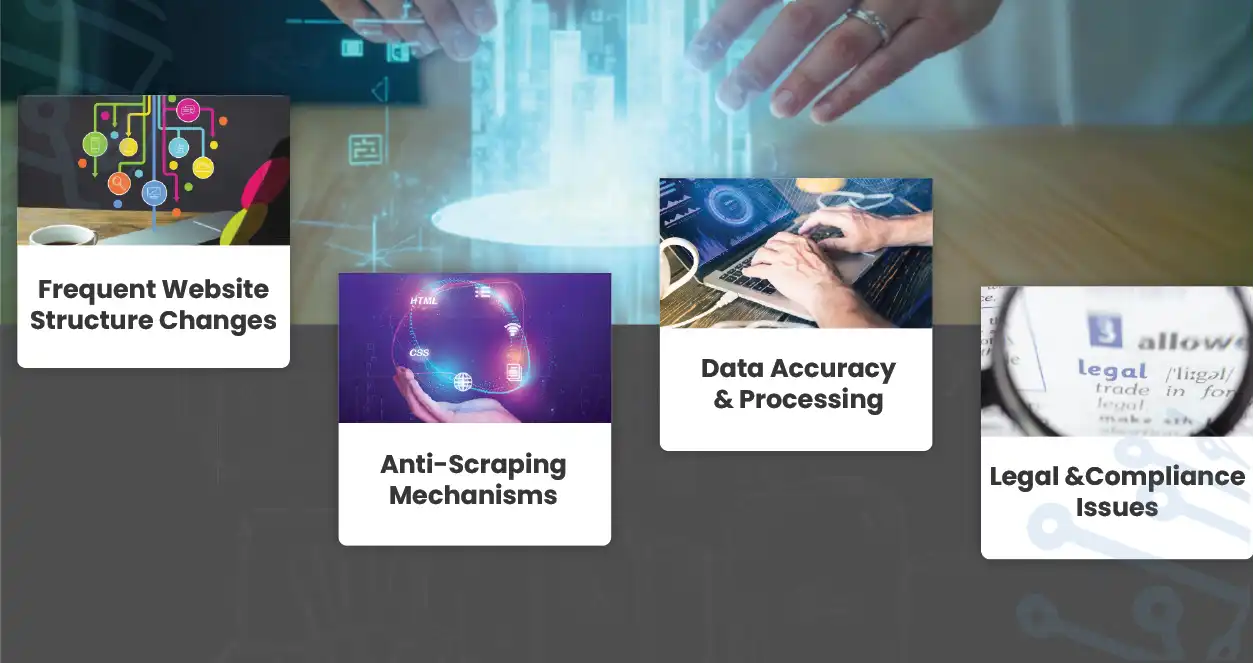
Frequent Website Structure Changes
One of the biggest challenges in Web Scraping Real Estate Data is that property listing websites frequently update their structures. Changes in page layouts, URL patterns, or data formatting can disrupt Real Estate Property Data Scraping workflows, requiring continuous monitoring and updates to scraping algorithms.
Anti-Scraping Mechanisms
Many real estate platforms deploy anti-scraping measures such as CAPTCHA, IP blocking, and JavaScript-based dynamic content loading. These challenges make Extracting Real Estate Property Datasets more complex, requiring the use of proxies, headless browsers, and AI-based data extraction techniques to bypass detection.
Data Accuracy & Processing
Ensuring high-quality, structured data is essential for Commercial Real Estate Data Scraping. Raw data collected from multiple sources can contain duplicates, missing fields, or outdated information, requiring thorough data validation, cleaning, and normalization before it can be used for analysis.
Legal & Compliance Issues
Adhering to legal and ethical guidelines is critical for Real Estate Data Scraping Services. Many real estate websites have terms of service restricting automated data extraction, and compliance with data privacy laws is necessary to avoid legal risks. Businesses must ensure that their Web Scraping Services follow best practices while extracting publicly available data.
Why Choose ArcTechnolabs?

ArcTechnolabs is a leader in Web Scraping Services, providing scalable and efficient solutions for Extracting Real Estate Property Datasets from various sources, including property listing websites, rental platforms, and commercial real estate portals. Our expertise in Web Scraping for Real Estate ensures businesses receive high-quality, structured data for competitive analysis and pricing optimization.
To tackle the challenges of website restrictions, we implement Web Scraping API Services with advanced anti-blocking techniques. Our AI-driven approach helps bypass CAPTCHA, IP bans, and dynamic content loading, ensuring smooth and uninterrupted data extraction. Additionally, we offer Real Estate Data Scraping Services that deliver real-time insights in structured formats, enabling businesses to make data-driven decisions effortlessly.
Conclusion
Real Estate Property Data Scraping plays a crucial role in shaping travel pricing strategies by providing real-time insights into accommodation costs and market trends. With Web Scraping Real Estate Data, travel companies can make data-driven decisions to optimize flight fares and hotel rates. By Extracting Real Estate Property Datasets, businesses gain access to crucial property insights, helping them stay competitive in a dynamic market.
ArcTechnolabs specializes in Web Scraping for Real Estate, offering advanced Commercial Real Estate Data Scraping solutions tailored to travel industry needs. Our Web Scraping Services ensure accurate, structured, and up-to-date property data, empowering businesses to enhance their pricing strategies effectively.
Contact ArcTechnolabs today to leverage Real Estate Data Scraping Services and transform your travel pricing with intelligent data insights!







